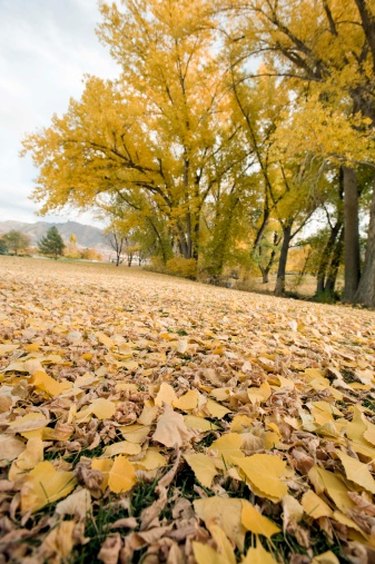Things You'll Need
Compost bin, 5 feet by 5 feet
Dry tree leaves
1/3-cup measure
High-nitrogen lawn fertilizer without herbicide
Garden soil
Pitchfork

Composting accelerates and controls the natural decay process to convert yard waste such as leaves into an organic soil conditioner. A compost pile requires the proper carbon and nitrogen ratio for quickest composting. Dried leaves are one source of carbon. After the compost is done, use it to amend garden soil or to mulch around growing plants. Compost added to heavy soil improves drainage, while compost added to sandy soil helps retain moisture and nutrients.
Step 1
Place an 8-inch layer of leaves on the bottom of the compost bin. Add water to moisten the dry leaves, but don't allow them to become soggy.
Video of the Day
Step 2
Sprinkle 1/3 cup each of lime and fertilizer evenly over the leaves. Add an inch of soil on top of the fertilizer.
Step 3
Add another 8-inch layer of leaves, and water them just until moist. Add 1/3 cup each of lime and fertilizer on top, followed by an inch of soil.
Step 4
Repeat Step 3 until you have a compost pile that is about 5 feet high.
Step 5
Turn the pile once or twice monthly, using a pitchfork. The aeration will encourage quicker composting. When turning the pile, squeeze a handful of the compost. If you can just squeeze out a drop of water, it has the correct amount of moisture in it.
Step 6
Add a little water if the compost is too dry. However, if you can squeeze several drops of water out of a handful of compost, mix in more dry leaves or other brown material until you get the right moisture level.
Warning
You may use less lime, but don’t add more than the specified amount. Both the University of Minnesota Extension and the University of Missouri Extension advise against adding lime to a compost pile because the finished compost may be too alkaline. Too much lime also will lead to a loss of nitrogen in the compost pile, which will prevent rapid composting.
Video of the Day